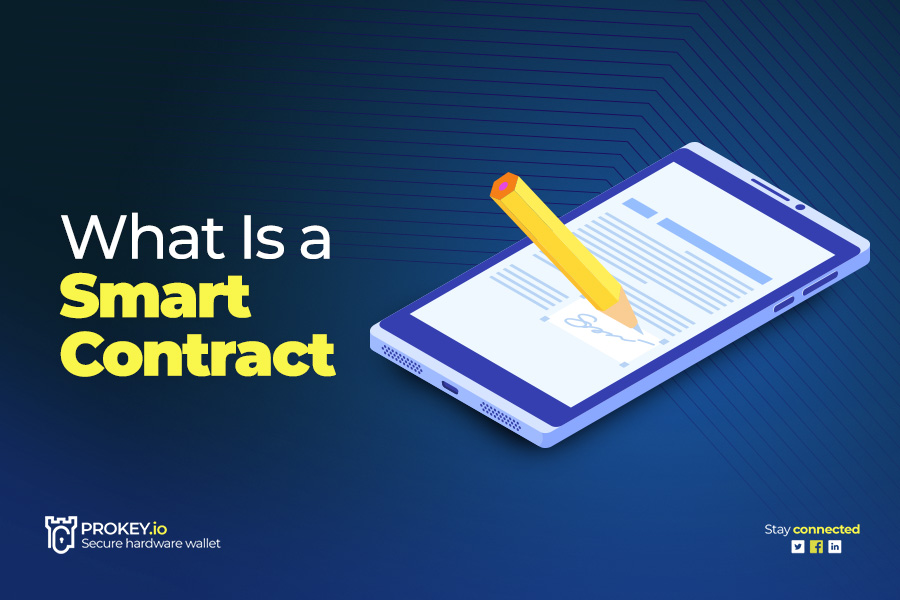What Is a Smart Contract and How Does It Work?


A smart contract is a term you often encounter when discussing blockchain technology. But it is one of those few people seem to be able to wrap their heads around. However, the whole idea of a smart contract is simpler than you think. It plays an essential role in making transactions happen securely and safely.
This guide will teach you the basic concepts of smart contracts, like how they work, their importance, and where they apply. If you read this guide, you will never have to google what a smart contract is again. But before we get into the technical stuff, we must briefly discuss its history.
What Is a Smart Contract?
Cryptographer and computer scientist Nick Szabo introduced the concept of smart contracts in 1994. He aimed to eliminate the need for a third party to make transactions. With smart contracts, transactions are self-executed on a trusted network by computers.
Smart contracts are protocols or computer programs stored on a blockchain that help automate the execution of an agreement when specific terms are met. Smart contracts in crypto are often run on a decentralized network. Despite their name, they are not legally binding but function to execute various business logic. Also, note that there are a variety of architectures for how smart contracts are developed, deployed, and distributed.
How Do Smart Contracts Work?
The working principles of smart contracts are pretty straightforward. However, setting up a smart contract starts with a business team working with developers to describe how the smart contract should behave in response to a particular event or circumstance. This event could be anything from confirming order shipment, utility meter reading, or payment authorization, amongst others.
Developers then create the smart contract on a platform using logic and test it to ensure it works as intended. A team of security experts then reviews the written application to ensure no loopholes.
Why Are Smart Contracts Better?
Smart contracts are better than the traditional method of managing transactions between businesses and parties in many ways. With smart contracts, businesses and users can enjoy several advantages over conventional processes. And the best part is that the benefits of using smart contracts are likely to increase soon as technology advances.
Below are some of the benefits of smart contracts:
- Autonomy
One of the significant benefits of using smart contracts is that its processes are automated. You do not need brokers or intermediaries to confirm or verify a particular transaction after the necessary conditions are met. Moreover, the absence of third parties or intermediaries makes it more beneficial than the traditional method.
- Accuracy
Since smart contracts are digital and automated programs, they tend to do only what the program is meant to do. Hence, this makes smart contracts as accurate as possible. In other words, the pitfalls of manually filling out forms are mitigated with smart contracts.
So, there is no paperwork hassle and no unnecessary time spent reconciling errors. The contract will execute immediately if the transaction’s condition is met.
- Speed
Another primary objective of smart contracts that many businesses benefit from is their high transaction speed processing power. The ability to process transactions fast is an essential feature that makes any business stand out. Smart contract processes are automated, requiring no human intervention to verify them, thus making them fast.
- Cost-efficient
With smart contracts, there is no need for a third-party intermediary. This mitigates the processing fees and operational costs incurred if there are intermediaries. In other words, you can save money with smart contracts since transactions and processes are automated.
- Safety
Another thing that makes smart contracts better is their attention to detail. Programmers design smart contracts such that they are encrypted cryptography, leaving no room for imperfection. Any transaction or deal done with the smart contract is safe from infiltration.
In addition, all documents on a smart contract are stored on the blockchain and duplicated multiple times to ensure you can restore the original copies in case of any data loss.
- Trust and transparency
With smart contracts, you have nothing to worry about information being tampered with for personal gain. Transactions are automated, encrypted, and even logged, thus making the possibility of tampering impossible. Encrypted records of transactions are shared across participants, clearing all doubt as to whether the information has been altered.
Challenges with using Smart Contracts?
Using smart contracts comes with several advantages, as explained above. However, a smart contract is in no way completely perfect. Developers will hopefully resolve some of the challenges associated with using smart contracts in the near future. But for now, here are some of the challenges to expect when using smart contracts.
- Management
The reason smart contracts are secure and so effective is that they are configured in such a way that they are difficult or impossible to change. Smart contracts are complicated to implement and manage. Changes to the smart contract process or correcting errors in the code are time-consuming and sometimes expensive. For this reason, developers must be careful during the designing phase and undergo several testing phases to ensure everything is in order before deploying it.
- Third-party
While a smart contract aims to eliminate the need for third parties, it cannot completely do away with third parties in a real sense. Unlike in traditional contracts, third parties in smart contracts assume different roles. For example, a team could be responsible for writing the code; another team could ensure all security measures are met, and another team could be responsible for deploying the program. The team responsible for designing a smart contract will always be in the picture.
- Alignment issues
With a smart contract, you can speed up the execution process that spans multiple parties. Smart contracts speed up the process either way, whether the processes align or don’t align with other parties’ intentions or understanding. Sadly, this can cause significant damage if things spiral out of control, particularly when there is hardly a way to stop or unwind the unintended behaviour.
- Security
Smart contracts are secured to a great level, but because they are relatively new, hackers continue to develop new ways to compromise them. For example, hackers could fake events that will trigger smart contracts to execute when they ought not.
Uses of Smart Contracts
Smart contracts are useful across several sectors. For example, a developer can integrate smart contracts into validating transactions – it does not have to be a financial transaction. This makes the possibilities of smart contracts endless.
Let’s look at some of the ways smart contracts have been benefiting some industries.
- Insurance companies
Smart contracts are highly applicable in the financial sector, particularly insurance companies. The processes help insurance companies to handle claims better. For instance, an insurance company that integrates smart contracts would be able to automate its policies and services, thus reducing administrative and processing costs. Smart contracts in insurance companies can also significantly reduce fraud.
- Health systems
The medical industry is widely known for ensuring patient information privacy. And smart contracts allow the transfer of data securely, thus preventing access by any third parties.
Smart contracts are also useful in the health sector in recording and safely transferring data. Hence, if a researcher wants to use patients’ data, they must pay for it, and not only that, the patient can choose whether or not they want to sell it.
- Government
Another sector where smart contracts are very useful is the government. Despite many governments not being so friendly with the whole idea of cryptocurrency, smart contracts can help in several government sectors. For example, a smart contract can help ensure a trustworthy result in the voting system. Using smart contracts for voting protects votes from fraud. When a voting transaction is written, developers cannot change it.
Wallets
When investing in cryptocurrency, owning the best wallet is essential. While there are several wallets you can use, no one competes against the cold storage hardware wallet, the Prokey wallet. Even though smart contracts wallet is a thing and offers several features such as recovery without seed phrase, and automatic blocking transfer, amongst others, Prokey wallet still performs excellently better.
Conclusion
You can see from this article that the whole working principle of smart contracts is straightforward. With no intermediary involved in several transactions, many industries benefit greatly. The best thing about having no intermediaries between transactions is that you will save a lot of money.
Although the potential downside of smart contracts is that many people will lose their jobs if they were to be integrated globally. But of course, no one knows what the future holds.
Introduction to the basic concepts of stablecoins



